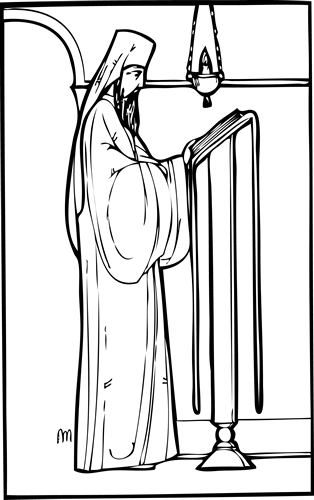|
|||
|---|---|---|---|
| This weekly bulletin insert complements the curriculum published by the Department of Christian Education of the Orthodox Church in America. This and many other Christian Education resources are available at http://dce.oca.org. | |||

The Church commemorates two men who lived in 18th-century Romania. Saint Sophronius and Saint Bessarion Sarai are called "confessors" for the faith. "Confessor" refers to someone who witnesses to the faith but is not directly killed, or martyred, for doing so. Many confessors, like Sophronius and Bessarion Sarai, still suffered greatly. Both men, by example, encouraged other Orthodox to resist powerful efforts to make them deny their ancestral faith and become Roman Catholics. Saint Bessarion Sarai, Serbian by birth, was born in 1714. After traveling to the Holy Land and being tonsured a monk in his mid-twenties, he returned to his homeland and lived in a remote cave. His prayer was so deep and sincere that he was granted the grace to work miracles. But like others who hoped to spend their lives in solitary prayer, his gifts were needed for the larger Church. The Romanian regions of Transylvania and Banat had seen the forcible union of numerous Orthodox to the Roman Catholic Church. Hearing of Bessarion's holy life, the regional Patriarch summoned him, ordained him, and sent him to teach and defend the faith in the troubled area. Bessarion obediently set out for Banat, where the Orthodox gladly gathered around this solitary monk who turned out to be an exceptional preacher who effectively reminded them that their Orthodox faith was a gift handed down to them through generations. He was able to bring large numbers of people back to the Church. But Empress Maria Theresa of Austria was a staunch Catholic (and, incidentally, mother of Marie Antoinette) with a keen personal interest in Banat. She had colonized it with German farmers who profited from its mineral wealth, and didn't want the local Orthodox stirring up trouble. So while Bessarion was traveling to visit his flock in 1774, he was arrested by the Austrian army and imprisoned in Vienna on her orders. Some months later he died in a dank cell. Saint Sophronius, a contemporary of Bessarion but Romanian by birth, also loved the quiet life of prayer. He too was tonsured a monk, and established a small hermitage in the Romanian forest. As his monastery grew in size and reputation, other men joined him. Sophronius shared Bessarion's concern that the Orthodox in Ardeal (the Romanian name for Transylvania) were being persecuted and pulled, sometimes by force, into the Roman Catholic Church. Like Bessarion, Sophronius traveled to villages to encourage people to stand firm against Roman Catholic pressure. Unfazed by imprisonment and torture, he decided to deal with the problem in a more political way, calling the Orthodox together to demand that an Orthodox bishop be appointed and that Romanians receive equal treatment under the law. Sophronius' methods were effective, and once the demands had been met he was content to enter a monastery and spend the rest of his life there. In Ephesians 4: 25, Saint Paul urges each of us to "speak truth with his neighbor, for we are members of one another." Finding themselves among Orthodox who were tempted and coerced to give up their faith, Saints Bessarion and Sophronius did just that. |
|||
